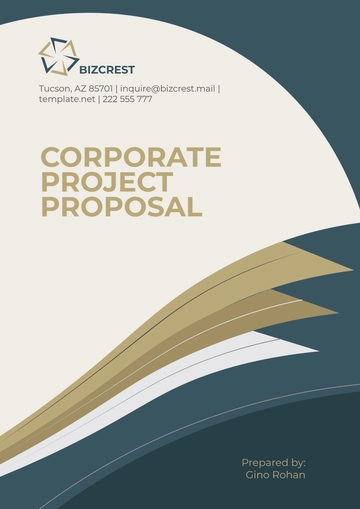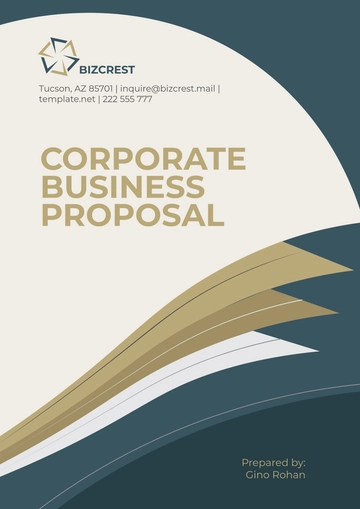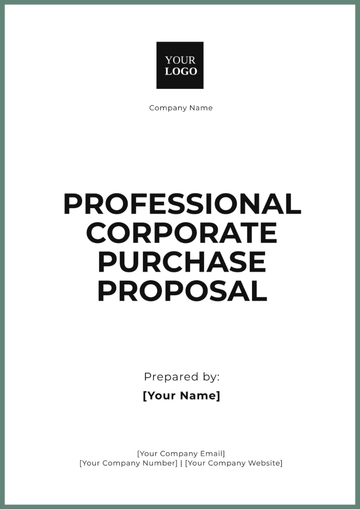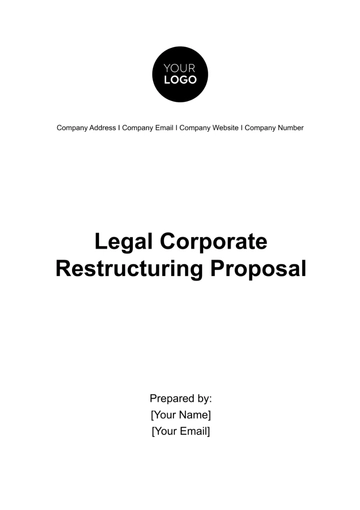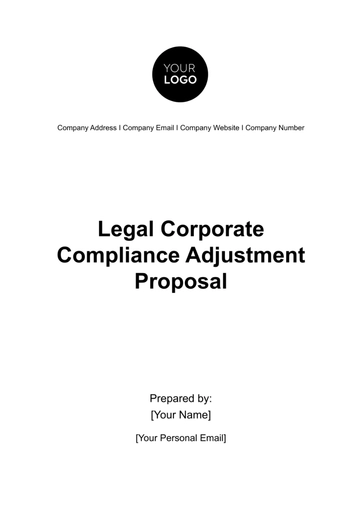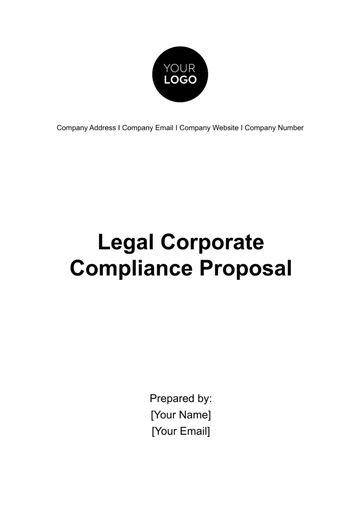Free Legal Corporate Compliance Adjustment Proposal
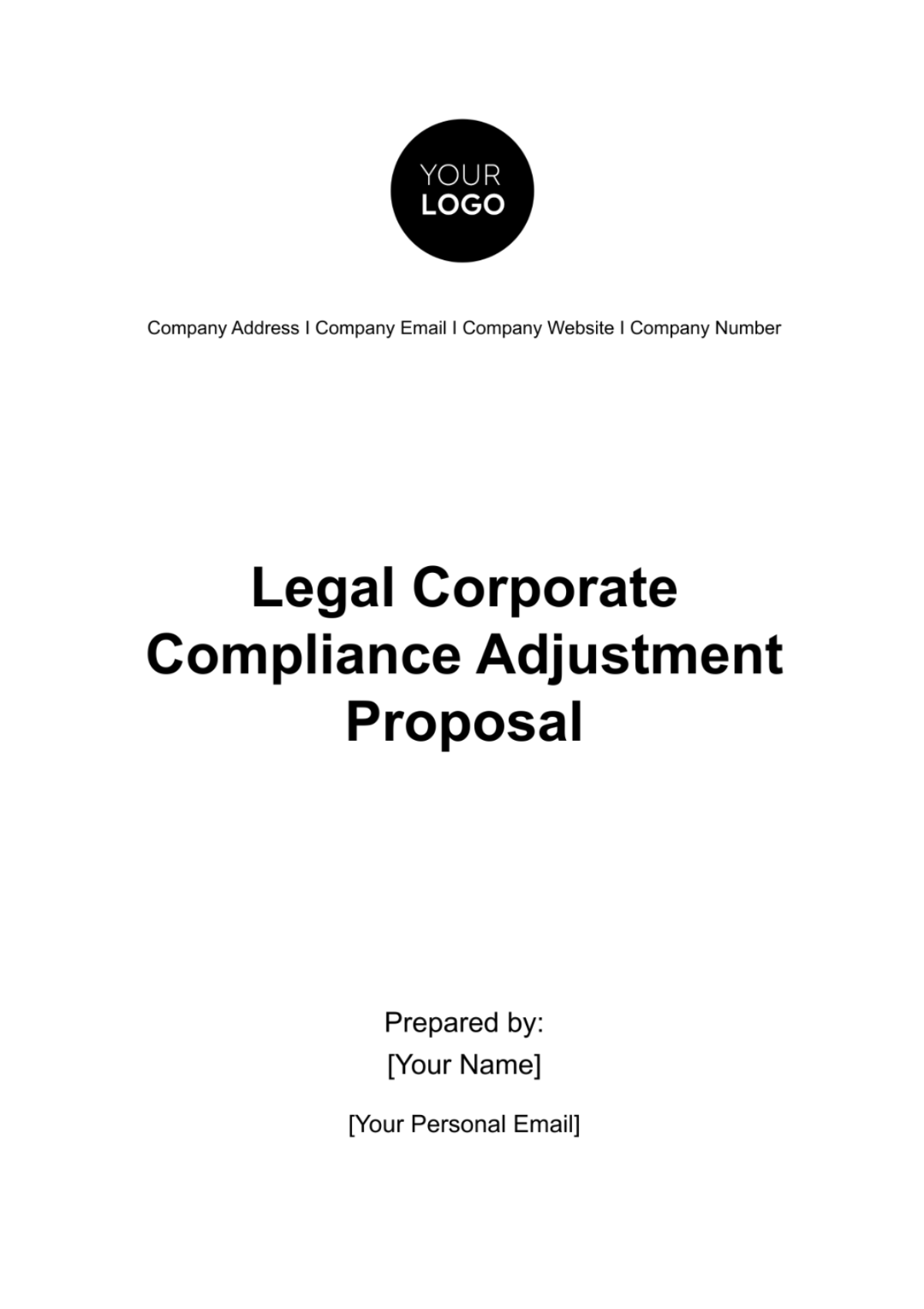
I. Introduction
At [Your Company Name], our unwavering commitment to legal compliance is not just a priority; it's a core value that underpins every aspect of our business operations. We recognize that adherence to laws, regulations, and industry standards is not only essential for avoiding legal repercussions but also critical for maintaining trust with our stakeholders and sustaining long-term success. As such, this proposal serves as a strategic roadmap for enhancing our compliance practices, navigating regulatory complexities, and reinforcing our dedication to ethical conduct and transparency.
II. Background and Context
In today's rapidly evolving regulatory landscape, businesses face unprecedented challenges in ensuring compliance with a myriad of laws and regulations spanning various jurisdictions and industries. At [Your Company Name], we understand the importance of staying ahead of regulatory developments and proactively adjusting our compliance strategies to mitigate risks effectively. Our analysis of the current compliance landscape has revealed several key trends and challenges:
Increasing Regulatory Complexity: Regulatory requirements are becoming more intricate and multifaceted, necessitating a deeper understanding of legal nuances and greater agility in adapting to regulatory changes.
Heightened Enforcement Actions: Regulatory authorities are intensifying their scrutiny of corporate conduct, imposing stricter penalties for non-compliance, and conducting more frequent audits and investigations.
Evolving Technology Landscape: Advances in technology are reshaping compliance practices, with emerging technologies such as artificial intelligence, blockchain, and data analytics offering new opportunities and challenges in regulatory compliance and risk management.
III. Scope of Compliance Adjustment
Our commitment to compliance extends across all dimensions of our business, encompassing not only legal requirements but also ethical principles, industry best practices, and stakeholder expectations. The scope of our compliance adjustment efforts includes:
Reviewing, revising, and updating existing policies, procedures, and controls to ensure alignment with the latest regulatory requirements and emerging risks.
Enhancing employee training and awareness programs to foster a culture of compliance, ethics, and accountability at all levels of the organization.
Strengthening internal monitoring and reporting mechanisms to detect and address compliance issues proactively and facilitate timely corrective actions.
Conducting regular risk assessments and gap analyses to identify areas of non-compliance, vulnerabilities, and opportunities for improvement across all operational functions and business units.
Establishing cross-functional compliance task forces or committees to facilitate collaboration, communication, and knowledge sharing among key stakeholders, departments, and business units to address complex compliance challenges and promote a unified approach to compliance management.
IV. Risk Assessment
A thorough risk assessment forms the foundation of our compliance adjustment process, enabling us to identify, prioritize, and mitigate potential compliance risks effectively. Our risk assessment methodology encompasses:
Conducting a comprehensive inventory of potential compliance risks, considering both internal and external factors, such as regulatory changes, market dynamics, and organizational vulnerabilities.
Assessing the likelihood and potential impact of identified risks on our business operations, financial performance, reputation, and stakeholder trust.
Developing risk mitigation strategies and action plans tailored to address high-priority compliance risks, mitigate potential impacts, and enhance our overall resilience to regulatory challenges.
V. Proposed Adjustments
Building upon our risk assessment findings, we propose a series of targeted adjustments to our compliance framework to reinforce our commitment to legal compliance and ethical conduct:
A. AML and KYC Policy Enhancement:
Customer Due Diligence (CDD) Enhancements: We will enhance our customer due diligence (CDD) processes by implementing advanced screening technologies, enhanced customer identification procedures, and enhanced risk-based assessments. This will enable us to better identify and verify customer identities, assess transactional risks, and detect suspicious activities more effectively.
Transaction Monitoring Optimization: We will optimize our transaction monitoring systems by leveraging machine learning algorithms, artificial intelligence, and predictive analytics to improve the accuracy and efficiency of our monitoring capabilities. This will enable us to better detect and investigate potentially fraudulent or illicit transactions in real time, thereby reducing the risk of financial crime and regulatory non-compliance.
Regulatory Reporting Streamlining: We will streamline our regulatory reporting processes by automating manual reporting tasks, standardizing reporting templates, and enhancing data quality controls. This will enable us to meet regulatory reporting requirements more efficiently, reduce reporting errors and discrepancies, and improve overall compliance with regulatory obligations.
B. Data Protection and Privacy Measures:
Data Encryption and Anonymization: We will enhance our data protection measures by implementing robust encryption and anonymization techniques to safeguard sensitive customer information and personal data. This will help mitigate the risk of data breaches, unauthorized access, and data exfiltration, ensuring compliance with GDPR, CCPA, and other data protection regulations.
Access Controls and Data Governance: We will strengthen our access control mechanisms and data governance frameworks to restrict unauthorized access to sensitive data, enforce data usage policies, and ensure data integrity and confidentiality. This will involve implementing role-based access controls, data classification schemes, and data lifecycle management processes to mitigate data privacy risks and enhance regulatory compliance.
Incident Response and Breach Notification: We will enhance our incident response and breach notification procedures to enable swift detection, containment, and remediation of data breaches or security incidents. This will involve establishing clear escalation pathways, response protocols, and communication strategies to notify affected parties, regulatory authorities, and other stakeholders in accordance with legal requirements.
C. Employee Training and Development:
Comprehensive Compliance Curriculum: We will develop and deploy a comprehensive compliance training curriculum covering a wide range of topics, including AML procedures, data protection requirements, cybersecurity best practices, workplace safety protocols, and diversity and inclusion initiatives. This will ensure that employees receive relevant and up-to-date training on key compliance areas to fulfill their roles effectively and responsibly.
Interactive Learning Platforms: We will leverage interactive learning platforms, such as e-learning modules, gamification, and virtual reality simulations, to enhance employee engagement, retention, and practical application of compliance knowledge and skills. This will provide employees with immersive learning experiences that promote active participation, knowledge retention, and skill development, ultimately fostering a culture of compliance and accountability.
Continuous Learning and Development: We will promote a culture of continuous learning and development by providing ongoing opportunities for employees to enhance their compliance knowledge and skills through workshops, seminars, conferences, and certifications. This will empower employees to stay abreast of regulatory developments, industry trends, and best practices, enabling them to adapt to evolving compliance requirements and contribute to our overall compliance objectives.
D. Vendor and Third-Party Management:
Vendor Due Diligence Enhancements: We will enhance our vendor due diligence processes by conducting comprehensive risk assessments, background checks, and periodic reviews of third-party vendors and service providers. This will enable us to better assess the integrity, reliability, and compliance posture of our vendors and mitigate the risk of regulatory non-compliance, reputational damage, and business disruption.
Contractual Compliance Obligations: We will incorporate contractual compliance obligations into vendor contracts and service agreements to ensure that vendors adhere to applicable laws, regulations, and industry standards. This will involve specifying compliance requirements, data protection clauses, and audit rights in vendor contracts to hold vendors accountable for their compliance performance and provide recourse in the event of non-compliance.
Ongoing Monitoring and Oversight: We will establish robust monitoring and oversight mechanisms to monitor vendor compliance performance, track key performance indicators (KPIs), and address compliance issues or breaches in a timely manner. This will involve implementing vendor risk management frameworks, conducting regular vendor audits, and establishing communication channels for reporting and resolving compliance concerns with vendors.
E. Corporate Governance and Ethics:
Board Oversight and Governance Structure: We will strengthen board oversight of compliance and ethics by enhancing board-level committees, such as the audit committee or compliance committee, to provide strategic guidance, review compliance initiatives, and monitor compliance performance. This will ensure that compliance considerations are integrated into board decision-making processes and governance structures, promoting a culture of compliance and ethical conduct at the highest levels of the organization.
Code of Conduct and Ethical Standards: We will update our code of conduct and ethical standards to reflect our commitment to compliance, integrity, and ethical conduct, aligning them with our organizational values, mission, and stakeholder expectations. This will involve clarifying expectations, defining prohibited behaviors, and providing guidance on ethical decision-making to guide employee conduct and promote a culture of ethics and accountability throughout the organization.
Whistleblower Protection and Reporting Mechanisms: We will enhance our whistleblower protection and reporting mechanisms to provide employees with confidential channels for reporting compliance concerns, unethical behavior, or potential violations of laws, regulations, or company policies. This will involve establishing anonymous reporting hotlines, whistleblower policies, and non-retaliation provisions to encourage open communication, transparency, and accountability and ensure that compliance issues are promptly addressed and remediated.
VI. Resource Requirements
Implementing the proposed adjustments will require a strategic allocation of resources, including financial investments, human capital, and technological infrastructure. The table below shows the resources requirement and the estimated costs:
Resource | Description | Estimated Cost |
|---|---|---|
AML and KYC Policy Revision | External consultancy services for policy review and enhancement | $20,000 |
Software upgrades for transaction monitoring systems | $15,000 | |
Employee training programs on updated policies and procedures | $10,000 | |
Data Protection Measures | Cybersecurity software for data encryption and access controls | $25,000 |
Personnel training on data protection requirements | $8,000 | |
Compliance audits to assess data protection compliance | $12,000 | |
Employee Training Programs | Development and delivery of training materials on compliance topics | $7,000 |
Employee time dedicated to participation in training activities | $5,000 | |
Engagement of external training providers for specialized training needs | $10,000 | |
Vendor and Third-Party Management | Vendor due diligence assessments and background checks | $15,000 |
Legal review and contractual negotiations for compliance clauses | $10,000 | |
Monitoring tools and oversight mechanisms for ongoing compliance | $8,000 | |
Corporate Governance and Ethics | Board committee enhancements for compliance oversight | $10,000 |
Code of conduct revisions and ethical standards updates | $5,000 | |
Implementation of whistleblower protection mechanisms | $7,000 |
VII. Monitoring and Reporting Mechanisms
Effective monitoring and reporting mechanisms are essential for maintaining ongoing compliance and ensuring timely detection and resolution of compliance issues. Our monitoring and reporting framework includes:
Regular audits, assessments, and reviews of compliance activities, controls, and processes to evaluate effectiveness, identify areas for improvement, and ensure adherence to regulatory requirements and internal policies.
Implementation of automated monitoring tools, data analytics platforms, and real-time reporting dashboards to facilitate proactive risk management, trend analysis, and decision-making.
Establishment of escalation procedures, incident response protocols, and communication channels to enable prompt reporting, investigation, and resolution of compliance incidents and concerns.
VIII. Training and Awareness Programs
We are committed to fostering a culture of compliance, ethics, and integrity throughout our organization through comprehensive training and awareness programs. Our initiatives include:
Development of a multi-faceted training curriculum encompassing a wide range of compliance topics, tailored to the needs and preferences of diverse employee groups, roles, and functions.
Deployment of interactive learning platforms, mobile applications, and virtual reality simulations to enhance employee engagement, retention, and practical application of compliance knowledge and skills.
Integration of compliance education and awareness initiatives into our onboarding process, performance management system, and leadership development programs to embed compliance principles into our organizational culture and values.
IX. Evaluation and Review
Continuous evaluation and review are essential to ensuring the effectiveness, efficiency, and relevance of our compliance efforts. Our evaluation and review process includes:
Regular monitoring of key performance indicators (KPIs), benchmarks, and metrics to measure the impact, efficiency, and effectiveness of our compliance initiatives and track progress towards achieving compliance objectives.
Conduct of periodic assessments, audits, and evaluations of compliance activities, controls, and processes to identify areas for improvement, address emerging risks, and enhance overall compliance performance.
Solicitation of feedback, input, and insights from employees, customers, regulators, and other stakeholders to assess the effectiveness, relevance, and responsiveness of our compliance practices and initiatives and identify opportunities for enhancement and innovation.
X. Conclusion
In conclusion, [Your Company Name] is committed to upholding the highest standards of corporate compliance, ethics, and integrity. By implementing the adjustments outlined in this proposal and adopting a proactive, strategic approach to compliance management, we will mitigate risks, enhance regulatory compliance, and safeguard our reputation, trust, and long-term viability. Our commitment to compliance extends beyond legal obligations to encompass ethical considerations, stakeholder expectations, and societal responsibilities, reflecting our unwavering dedication to ethical conduct, responsible business practices, and sustainable value creation.
XI. Appendices
Legal References and Regulatory Guidance Documents
Compliance Checklists and Assessment Tools
Data Analysis Reports and Risk Assessment Findings
Training Materials and Curriculum Outlines
Audit Reports and Compliance Performance Metrics
- 100% Customizable, free editor
- Access 1 Million+ Templates, photo’s & graphics
- Download or share as a template
- Click and replace photos, graphics, text, backgrounds
- Resize, crop, AI write & more
- Access advanced editor
Enhance compliance practices with Template.net's Legal Corporate Compliance Adjustment Proposal Template. This editable and customizable proposal template, available on Template.net alongside our AI Editor Tool, provides a structured framework to identify compliance gaps, propose adjustment strategies, and outline implementation plans to ensure adherence to legal standards. Drive compliance excellence with Template.net!
You may also like
- Business Proposal
- Research Proposal
- Proposal Request
- Project Proposal
- Grant Proposal
- Photography Proposal
- Job Proposal
- Budget Proposal
- Marketing Proposal
- Branding Proposal
- Advertising Proposal
- Sales Proposal
- Startup Proposal
- Event Proposal
- Creative Proposal
- Restaurant Proposal
- Blank Proposal
- One Page Proposal
- Proposal Report
- IT Proposal
- Non Profit Proposal
- Training Proposal
- Construction Proposal
- School Proposal
- Cleaning Proposal
- Contract Proposal
- HR Proposal
- Travel Agency Proposal
- Small Business Proposal
- Investment Proposal
- Bid Proposal
- Retail Business Proposal
- Sponsorship Proposal
- Academic Proposal
- Partnership Proposal
- Work Proposal
- Agency Proposal
- University Proposal
- Accounting Proposal
- Real Estate Proposal
- Hotel Proposal
- Product Proposal
- Advertising Agency Proposal
- Development Proposal
- Loan Proposal
- Website Proposal
- Nursing Home Proposal
- Financial Proposal
- Salon Proposal
- Freelancer Proposal
- Funding Proposal
- Work from Home Proposal
- Company Proposal
- Consulting Proposal
- Educational Proposal
- Construction Bid Proposal
- Interior Design Proposal
- New Product Proposal
- Sports Proposal
- Corporate Proposal
- Food Proposal
- Property Proposal
- Maintenance Proposal
- Purchase Proposal
- Rental Proposal
- Recruitment Proposal
- Social Media Proposal
- Travel Proposal
- Trip Proposal
- Software Proposal
- Conference Proposal
- Graphic Design Proposal
- Law Firm Proposal
- Medical Proposal
- Music Proposal
- Pricing Proposal
- SEO Proposal
- Strategy Proposal
- Technical Proposal
- Coaching Proposal
- Ecommerce Proposal
- Fundraising Proposal
- Landscaping Proposal
- Charity Proposal
- Contractor Proposal
- Exhibition Proposal
- Art Proposal
- Mobile Proposal
- Equipment Proposal
- Student Proposal
- Engineering Proposal
- Business Proposal
